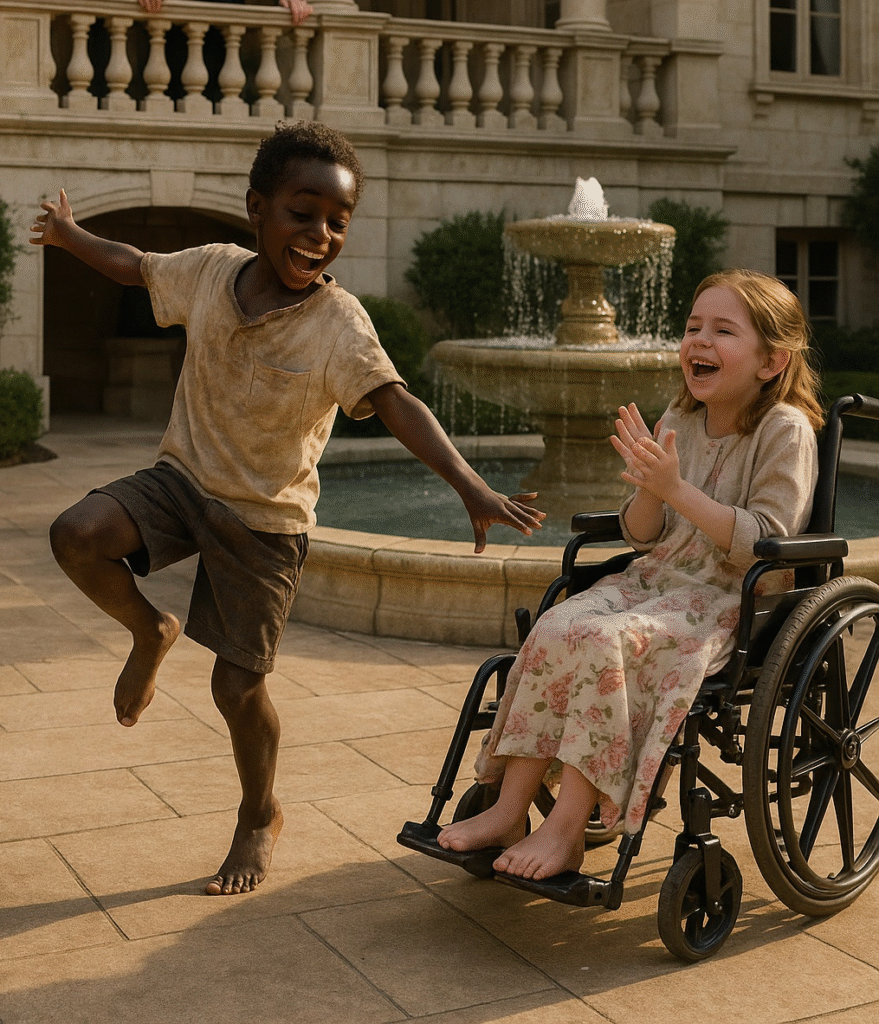Daniel Carter had everything money could buy—skyscrapers, businesses, respect—but none of it mattered inside his mansion, where silence had replaced his daughter Emily’s laughter.

After the accident, Emily survived—but was paralyzed from the waist down. Wheelchair-bound, her world shrank. Doctors, specialists, therapies, and countless programs failed to bring back her spark. Her smile disappeared. Her voice vanished. For months, the mansion was filled only with quiet sorrow.
One warm summer afternoon, Emily sat by the fountain, wrapped in her floral blanket. Her eyes were distant, her expression blank. That’s when he appeared.
A barefoot boy, ragged and thin, no older than ten, had wandered into the garden. His shirt was torn, his knees scraped, his spirit bright despite his hunger.
Daniel tensed, ready to call security. But the boy didn’t beg or steal. He began to dance.
His movements were clumsy, wild, even silly—but to Emily, it was magic. Her lips curved upward. A soft giggle escaped, then a full, joyous laugh—the first in months. She clapped her hands, eyes shining with delight.
The boy danced harder, twirling, stomping, bowing dramatically. Emily laughed louder, cheeks flushed. Daniel stood frozen, torn between anger at the trespasser and awe at what he had done.
No therapy had worked. No doctor had succeeded. Yet a homeless boy, hungry and unnoticed, had brought his daughter’s laughter back.
When Daniel finally stepped into the garden, the boy froze.
“Wait,” Daniel said gently. “What’s your name?”
“Leo,” the boy whispered. “I was hungry… but she looked sad. I just wanted to make her smile.”
Emily tugged at her father’s sleeve, speaking for the first time in weeks. “Papa… he’s funny. Can he stay?”
That evening, Daniel made a choice that stunned everyone who knew him. Instead of sending Leo away, he welcomed him into their home. A guest room, clean clothes, meals—he provided everything without question.
Leo remained humble. Each morning, he brought laughter, dances, and games. He wheeled Emily into the garden, taught her claps and arm movements, and encouraged her to move with him. Slowly, Emily’s voice returned. Her laughter came more freely. Her spark reignited.
One afternoon, Daniel overheard a conversation under the rose arch.
“You’re not broken,” Leo told her gently. “You’re just sitting in a different kind of chair. But your laugh—your laugh makes the whole world dance.”
Emily smiled. “And you’re not just funny. You’re my best friend.”
Daniel realized something profound. Money could build empires, but it couldn’t heal hearts. Emily’s healing had come from love, friendship, and the courage of a boy who had nothing but gave everything.
He ensured Leo’s future would be secure—schooling, opportunities, and a place where he truly belonged. The story eventually made headlines: “The Miracle in the Garden,” a tale of how a homeless boy brought laughter back to a billionaire’s daughter.
When asked why he had adopted Leo, Daniel’s answer was simple:
“Because he gave me back my daughter.”
Years later, the garden remained sacred. The fountain trickled, the roses bloomed, and laughter once again filled the air. Emily, still in her wheelchair, had grown into a confident young woman. Leo, once barefoot and hungry, thrived as her brother—full of the same playful spirit that had saved her.
Daniel often looked at them, gratitude swelling in his chest. He had once believed wealth was measured in money. Now he knew: true wealth was laughter, love, and family—unexpected, unearned, and priceless.